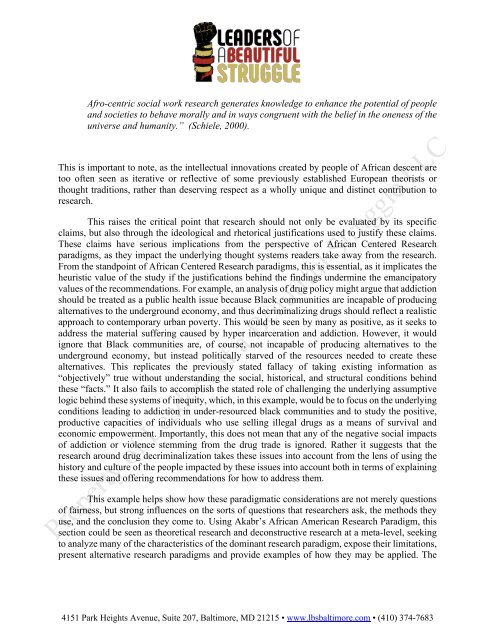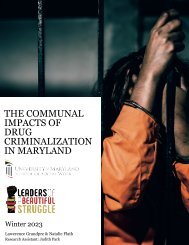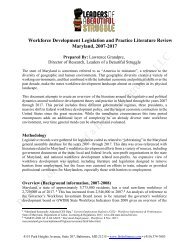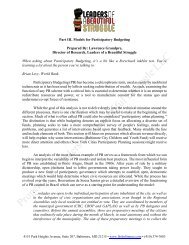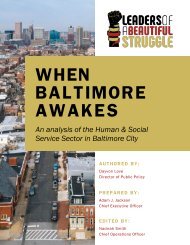Drug Decriminalization in Maryland Through an African Centered Research Paradigm- Analysis and Recommendations
This document offers guidance for theorizing questions related to a proposed research project purposed to advance drug decriminalization in Maryland.
This document offers guidance for theorizing questions related to a proposed research project purposed to advance drug decriminalization in Maryland.
- No tags were found...
You also want an ePaper? Increase the reach of your titles
YUMPU automatically turns print PDFs into web optimized ePapers that Google loves.
Afro-centric social work research generates knowledge to enh<strong>an</strong>ce the potential of people<br />
<strong>an</strong>d societies to behave morally <strong>an</strong>d <strong>in</strong> ways congruent with the belief <strong>in</strong> the oneness of the<br />
universe <strong>an</strong>d hum<strong>an</strong>ity.” (Schiele, 2000).<br />
This is import<strong>an</strong>t to note, as the <strong>in</strong>tellectual <strong>in</strong>novations created by people of Afric<strong>an</strong> descent are<br />
too often seen as iterative or reflective of some previously established Europe<strong>an</strong> theorists or<br />
thought traditions, rather th<strong>an</strong> deserv<strong>in</strong>g respect as a wholly unique <strong>an</strong>d dist<strong>in</strong>ct contribution to<br />
research.<br />
This raises the critical po<strong>in</strong>t that research should not only be evaluated by its specific<br />
claims, but also through the ideological <strong>an</strong>d rhetorical justifications used to justify these claims.<br />
These claims have serious implications from the perspective of Afric<strong>an</strong> <strong>Centered</strong> <strong>Research</strong><br />
paradigms, as they impact the underly<strong>in</strong>g thought systems readers take away from the research.<br />
From the st<strong>an</strong>dpo<strong>in</strong>t of Afric<strong>an</strong> <strong>Centered</strong> <strong>Research</strong> paradigms, this is essential, as it implicates the<br />
heuristic value of the study if the justifications beh<strong>in</strong>d the f<strong>in</strong>d<strong>in</strong>gs underm<strong>in</strong>e the em<strong>an</strong>cipatory<br />
values of the recommendations. For example, <strong>an</strong> <strong>an</strong>alysis of drug policy might argue that addiction<br />
should be treated as a public health issue because Black communities are <strong>in</strong>capable of produc<strong>in</strong>g<br />
alternatives to the underground economy, <strong>an</strong>d thus decrim<strong>in</strong>aliz<strong>in</strong>g drugs should reflect a realistic<br />
approach to contemporary urb<strong>an</strong> poverty. This would be seen by m<strong>an</strong>y as positive, as it seeks to<br />
address the material suffer<strong>in</strong>g caused by hyper <strong>in</strong>carceration <strong>an</strong>d addiction. However, it would<br />
ignore that Black communities are, of course, not <strong>in</strong>capable of produc<strong>in</strong>g alternatives to the<br />
underground economy, but <strong>in</strong>stead politically starved of the resources needed to create these<br />
alternatives. This replicates the previously stated fallacy of tak<strong>in</strong>g exist<strong>in</strong>g <strong>in</strong>formation as<br />
“objectively” true without underst<strong>an</strong>d<strong>in</strong>g the social, historical, <strong>an</strong>d structural conditions beh<strong>in</strong>d<br />
these “facts.” It also fails to accomplish the stated role of challeng<strong>in</strong>g the underly<strong>in</strong>g assumptive<br />
logic beh<strong>in</strong>d these systems of <strong>in</strong>equity, which, <strong>in</strong> this example, would be to focus on the underly<strong>in</strong>g<br />
conditions lead<strong>in</strong>g to addiction <strong>in</strong> under-resourced black communities <strong>an</strong>d to study the positive,<br />
productive capacities of <strong>in</strong>dividuals who use sell<strong>in</strong>g illegal drugs as a me<strong>an</strong>s of survival <strong>an</strong>d<br />
economic empowerment. Import<strong>an</strong>tly, this does not me<strong>an</strong> that <strong>an</strong>y of the negative social impacts<br />
of addiction or violence stemm<strong>in</strong>g from the drug trade is ignored. Rather it suggests that the<br />
research around drug decrim<strong>in</strong>alization takes these issues <strong>in</strong>to account from the lens of us<strong>in</strong>g the<br />
history <strong>an</strong>d culture of the people impacted by these issues <strong>in</strong>to account both <strong>in</strong> terms of expla<strong>in</strong><strong>in</strong>g<br />
these issues <strong>an</strong>d offer<strong>in</strong>g recommendations for how to address them.<br />
This example helps show how these paradigmatic considerations are not merely questions<br />
of fairness, but strong <strong>in</strong>fluences on the sorts of questions that researchers ask, the methods they<br />
use, <strong>an</strong>d the conclusion they come to. Us<strong>in</strong>g Akabr’s Afric<strong>an</strong> Americ<strong>an</strong> <strong>Research</strong> <strong>Paradigm</strong>, this<br />
section could be seen as theoretical research <strong>an</strong>d deconstructive research at a meta-level, seek<strong>in</strong>g<br />
to <strong>an</strong>alyze m<strong>an</strong>y of the characteristics of the dom<strong>in</strong><strong>an</strong>t research paradigm, expose their limitations,<br />
present alternative research paradigms <strong>an</strong>d provide examples of how they may be applied. The<br />
4151 Park Heights Avenue, Suite 207, Baltimore, MD 21215 • www.lbsbaltimore.com • (410) 374-7683


